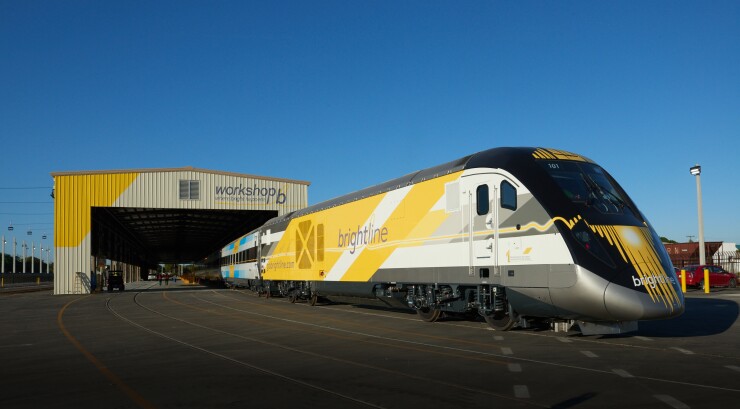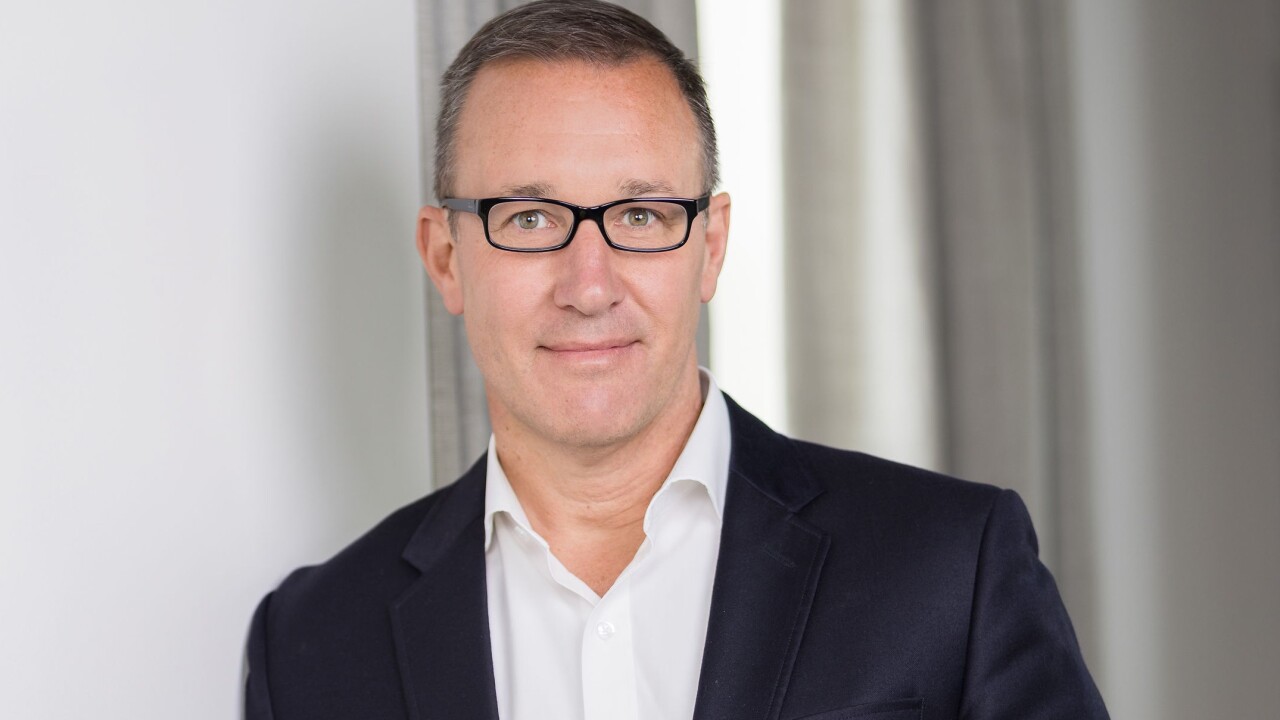BRADENTON, Fla. - The private company preparing to offer new passenger rail service in Florida appears to hedging its bets on whether to use private activity bonds to finance the project.
All Aboard Florida and its parent company, Florida East Coast Industries, inquired in recent months about obtaining a low-interest loan to finance its Brightline-branded train service from the U.S. Department of Transportation’s Federal Railroad Administration, according to correspondence obtained by The Bond Buyer.

“As a follow-up to our call today, I write to advise you of All Aboard Florida-Operations LLC’s intention to submit promptly an application for a Railroad Rehabilitation and Improvement Financing loan,” Brightline Chief Executive Officer Dave Howard wrote in an April 11 letter to Roger Bohnert, deputy executive director of USDOT’s Build America Bureau.
Howard said the loan would be used to complete AAF’s express passenger railroad system between Miami and Orlando.
All Aboard Florida received a $600 million PAB allocation from the USDOT to finance the initial service route from Miami to West Palm Beach, which it expects to begin operating this fall.
When asked if AAF planned to forego using tax-exempt bonds to finance its project, the company said in a statement that it remains open to using PABs and other forms of federally supported financing.
“Brightline is considering all funding options,” the company said. “We continue to explore financing mechanisms that exist for projects that incent private companies to invest in infrastructure used by the public.”
Private activity bonds are funded by private investors, who don't pay income tax on the interest they receive.

Letters and emails between All Aboard Florida, Florida East Coast Industries and transportation officials during April and May show that meetings have been scheduled to discuss updates to AAF’s financing plan, a new ridership and revenue study that is underway, and what will be necessary for the RRIF application to complete the underwriting process.
This is not the first time AAF has sought a RRIF loan. In 2014, the company said it applied for a $1.6 billion RRIF loan to finance its 235-mile project. The application triggered an extensive environmental review process under the National Environmental Policy Act.
While the NEPA review was underway, the company changed course and received a $1.75 billion private activity bond allocation from USDOT.
Martin and Indian River counties challenged the bond allocation in early 2015, filing federal lawsuits contending that the bonds should have been considered in the NEPA environmental review process.
As the company defended the suits, All Aboard Florida was unsuccessful several times attempting to sell the bonds using the Florida Development Finance Corp. as the conduit issuer.
In August 2016, U.S. District Judge Christopher R. Cooper said – in a potentially precedent-setting ruling – that the counties proved that the private activity bond allocation should have been subject to the NEPA process.
The decision prompted AAF to withdraw its $1.75 billion PAB application for the entire project. The company then received $600 million to finance phase 1 of the route from Miami to West Palm Beach, stopping short of passing through Indian River and Martin counties.
Cooper ruled on May 10 that the county lawsuits were moot because the $600 million PABs would finance a portion of the project that does not affect them. The ruling is not yet final, and could be appealed. Indian River County has not made a final decision with respect to Cooper’s ruling, County Attorney Dylan Reingold said Friday.
Last week, Florida East Coast Industries Executive Director Michael Reininger discussed a number of difficulties All Aboard Florida has encountered – and how those problems affect the private sector - when he testified before the U.S. House Transportation and Infrastructure Subcommittee on Railroads, Pipelines and Hazardous Materials.
“Regulatory hurdles” and “opaque and complex” rules for federally supported financing such as tax-exempt bonds create uncertainty for private companies like his to develop new transportation projects, Reininger said.
“In the face of so many regulatory hurdles, combined with the ease by which narrow interests can delay worthy projects through legal and administrative challenges, rationalization of this reality will dramatically improve the interest and motivations of private investment capital,” said Reininger, who is also AAF’s former president.
Reininger also said when All Aboard Florida submitted its original application for a RRIF loan, it triggered a comprehensive study through the NEPA process that required nine different entities to follow “prescriptive guidelines” in order to sign off on the federal environmental impact study.
The EIS was released in 2015, although the NEPA process remains incomplete because a “record of decision” – a USDOT official’s signature signing off on the project – has not been issued.
“We believe a two-year goal, from initiation to record of decision for NEPA reviews, is not only achievable, but a necessary regulatory requirement in order to attract private investment,” Reininger told the subcommittee.
Opponents of the train project view the situation differently. Reininger’s testimony before the subcommittee was disingenuous, said attorney Stephen Ryan, who represents Martin County and the local anti-train group CARE (Citizens Against Rail Expansion).
“He should get the chutzpah award for claiming that NEPA and other program rules are difficult and opaque, when AAF and USDOT have used the rules to prevent the appropriate path to a legal challenge of the railroad,” he said.
Ryan contended that All Aboard Florida in conjunction with the USDOT has purposely withheld the release of the record of decision on the environmental impact statement, because once the ROD is released it can be challenged in U.S. District Court by the citizens impacted by it.
“They have manipulated the process in an unfair way,” he said. “It insults the intelligence of voters who pay taxes that AAF would complain in a congressional hearing room about the problems in the process when they’ve deliberately manipulated and frustrated the process the way they have.
“We did not delay [AAF] a day,” he added. “They tried four times to sell the bonds and failed. Now they are giving up on tax subsidized bonds and switching back to a different form of subsidy, a federal loan. The irony is they previously abandoned the subsidized loan for subsidized bonds in 2014. As Yogi Berra would have said: ‘Its déjà vu all over again.’”
CARE Chairman Brent Hanlon said his organization has worked the past three years to “shed light on the All Aboard Florida project and how it threatens the health and safety of our communities.”
He also decried payments that local taxpayers must make in perpetuity for new train crossing and safety equipment maintenance because of the new passenger train service.
“We have also tried to reveal the facts about AAF’s insatiable need for public subsidies of its business plans,” he said, referring to the interest payments that the federal government does not receive from the issuance of tax-exempt bonds.
Hanlon also said that AAF’s latest strategy to seek a low-interest federal loan from the FRA also amounts to a “multi-billion-dollar loan subsidized by the U.S. taxpayers.
“The new RRIF loan poses many new risks to the taxpayers because there are no guarantees that AAF will be able to repay the loan,” he said. “If that happens, taxpayers will be left holding the bag for potentially billions of dollars.”
During last week’s House subcommittee meeting, Reininger said All Aboard Florida is “not publicly funded at all. It’s completely an investment of private-sector capital.”
Rep. Brian Mast, R-Fla., asked Reininger about the potential subsidy the project would receive from the use of a RRIF loan or private activity bonds. The RRIF loan would be from the federal government and the bonds are “100% capital” from the private sector, Reininger said, adding, “That’s not the same as an investment by the federal government.”
All Aboard Florida plans to run 32 trains per day between Miami and Orlando, at speeds up to 120 mph.
Company officials have said the service will begin this fall initially between West Palm Beach and Fort Lauderdale, with the addition of a stop in Miami later.
Work on the second phase between West Palm Beach and Orlando has not begun, although construction is underway on a new terminal at Orlando International Airport where AAF has said it will rent space at fair-market prices.





